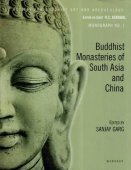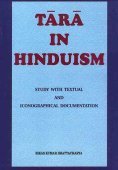Indira, Indirā, Imdira: 11 definitions
Introduction:
Indira means something in Hinduism, Sanskrit, Jainism, Prakrit. If you want to know the exact meaning, history, etymology or English translation of this term then check out the descriptions on this page. Add your comment or reference to a book if you want to contribute to this summary article.
In Hinduism
Purana and Itihasa (epic history)
Source: Cologne Digital Sanskrit Dictionaries: The Purana Index1a) Indirā (इन्दिरा).—A surname of Lakṣmī; a śakti bearer of fly whisk to Lalitā.*
- * Bhāgavata-purāṇa X. 31. 1; Brahmāṇḍa-purāṇa IV. 35. 98.
1b) R. a mahānadi.*
- * Vāyu-purāṇa 108. 79.

The Purana (पुराण, purāṇas) refers to Sanskrit literature preserving ancient India’s vast cultural history, including historical legends, religious ceremonies, various arts and sciences. The eighteen mahapuranas total over 400,000 shlokas (metrical couplets) and date to at least several centuries BCE.
Vaishnavism (Vaishava dharma)
Source: Devotees Vaishnavas: Śrī Garga SaṃhitāIndirā (इन्दिरा) refers to the twenty-first of twenty-six ekādaśīs according to the Garga-saṃhitā 4.8.9. Accordingly, “to attain Lord Kṛṣṇa’s mercy you should follow the vow of fasting on ekādaśī. In that way You will make Lord Kṛṣṇa into your submissive servant. Of this there is no doubt”. A person who chants the names of these twenty-six ekādaśīs (e.g., Indirā) attains the result of following ekādaśī for one year.

Vaishnava (वैष्णव, vaiṣṇava) or vaishnavism (vaiṣṇavism) represents a tradition of Hinduism worshipping Vishnu as the supreme Lord. Similar to the Shaktism and Shaivism traditions, Vaishnavism also developed as an individual movement, famous for its exposition of the dashavatara (‘ten avatars of Vishnu’).
Languages of India and abroad
Sanskrit dictionary
Source: DDSA: The practical Sanskrit-English dictionaryIndirā (इन्दिरा).—[ind-kirac] Name of Lakṣmi, wife of Viṣṇu.
Source: Cologne Digital Sanskrit Dictionaries: Shabda-Sagara Sanskrit-English DictionaryIndirā (इन्दिरा).—f.
(-rā) A name of Lakshmi, the wife of Vishnu. E. idi as above, and rā who gives.
Source: Cologne Digital Sanskrit Dictionaries: Monier-Williams Sanskrit-English Dictionary1) Indirā (इन्दिरा):—f. Name of Lakṣmī, wife of Viṣṇu, [Kathāsaritsāgara; Bhāgavata-purāṇa]
2) beauty, splendour.
Source: Cologne Digital Sanskrit Dictionaries: Yates Sanskrit-English DictionaryIndirā (इन्दिरा):—(rā) 1. f. Lakshmī.
Source: DDSA: Paia-sadda-mahannavo; a comprehensive Prakrit Hindi dictionary (S)Indira (इन्दिर) in the Sanskrit language is related to the Prakrit words: Iṃdira, Iṃdirā.
[Sanskrit to German]
Sanskrit, also spelled संस्कृतम् (saṃskṛtam), is an ancient language of India commonly seen as the grandmother of the Indo-European language family (even English!). Closely allied with Prakrit and Pali, Sanskrit is more exhaustive in both grammar and terms and has the most extensive collection of literature in the world, greatly surpassing its sister-languages Greek and Latin.
Prakrit-English dictionary
Source: DDSA: Paia-sadda-mahannavo; a comprehensive Prakrit Hindi dictionary1) Iṃdira (इंदिर) in the Prakrit language is related to the Sanskrit word: Indira.
2) Iṃdirā (इंदिरा) also relates to the Sanskrit word: Indirā.
Prakrit is an ancient language closely associated with both Pali and Sanskrit. Jain literature is often composed in this language or sub-dialects, such as the Agamas and their commentaries which are written in Ardhamagadhi and Maharashtri Prakrit. The earliest extant texts can be dated to as early as the 4th century BCE although core portions might be older.
Kannada-English dictionary
Source: Alar: Kannada-English corpusIṃdira (ಇಂದಿರ):—[noun] = ಇಂದರ - [imdara -] 1.
Kannada is a Dravidian language (as opposed to the Indo-European language family) mainly spoken in the southwestern region of India.
See also (Relevant definitions)
Starts with (+4): Imdiradikku, Imdiraja, Imdirajastra, Imdirajastrakshi, Imdiravaral, Imdiravil, Indira ashvinakrishna, Indirabhyudaya, Indiradayita, Indiragandhi, Indiragandhicarita, Indirajar, Indiralaya, Indiralayam, Indiramandira, Indiraparinaya, Indirapati, Indiravacham, Indiravalli, Indiravara.
Ends with: Abdhidindira, Abdhihindira, Dindira, Hindira, Indindira, Krishnapindira, Kshirahindira, Latadindira, Msindira, Pindira, Tirindira.
Full-text: Indiralaya, Indiramandira, Indiravara, Indiradayita, Indiralayam, Indira ashvinakrishna, Amaravati, Indivara, Ekadashi, Brahmavaivartapurana.
Relevant text
Search found 27 books and stories containing Indira, Indirā, Imdira, Iṃdira, Iṃdirā; (plurals include: Indiras, Indirās, Imdiras, Iṃdiras, Iṃdirās). You can also click to the full overview containing English textual excerpts. Below are direct links for the most relevant articles:
Garga Samhita (English) (by Danavir Goswami)
Verse 8.13.133 < [Chapter 13 - A Thousand Names of Lord Balarāma]
Verse 4.8.16 < [Chapter 8 - In the Story of the Yajña-sītās, the Glories of Ekādaśī]
Verse 5.15.23 < [Chapter 15 - Seeing Sri Radha]
Sahitya-kaumudi by Baladeva Vidyabhushana (by Gaurapada Dāsa)
Text 10.106 < [Chapter 10 - Ornaments of Meaning]
The Padma Purana (by N.A. Deshpande)
Chapter 58 - Indirā Ekādaśí < [Section 6 - Uttara-Khaṇḍa (Concluding Section)]
Chapter 8 - Prelude to the Churning of Ocean < [Section 4 - Brahma-khaṇḍa (Section on Brahman)]
Chapter 1 - Sūta Romaharṣaṇa Agrees to Narrate Padma Purāṇa < [Section 3 - Svarga-khaṇḍa (section on the heavens)]
Was It Indira? < [January-March 1942]
Indira Gandhi < [October – December, 1984]
A Repository of Songs and Stories < [August 1947]
Chaitanya Bhagavata (by Bhumipati Dāsa)
Verse 2.1.297 < [Chapter 1 - The Beginning of the Lord’s Manifestation and His Instructions on Kṛṣṇa-saṅkīrtana]
The Skanda Purana (by G. V. Tagare)
Chapter 249 - Greatness of Tulasī < [Section 1 - Tīrtha-māhātmya]
Chapter 25 - Kalahā Attains Liberation < [Section 4 - Kārttikamāsa-māhātmya]
Chapter 8 - The Marriage of Śrīnivāsa and Padmāvatī < [Section 1 - Veṅkaṭācala-māhātmya]
Related products

